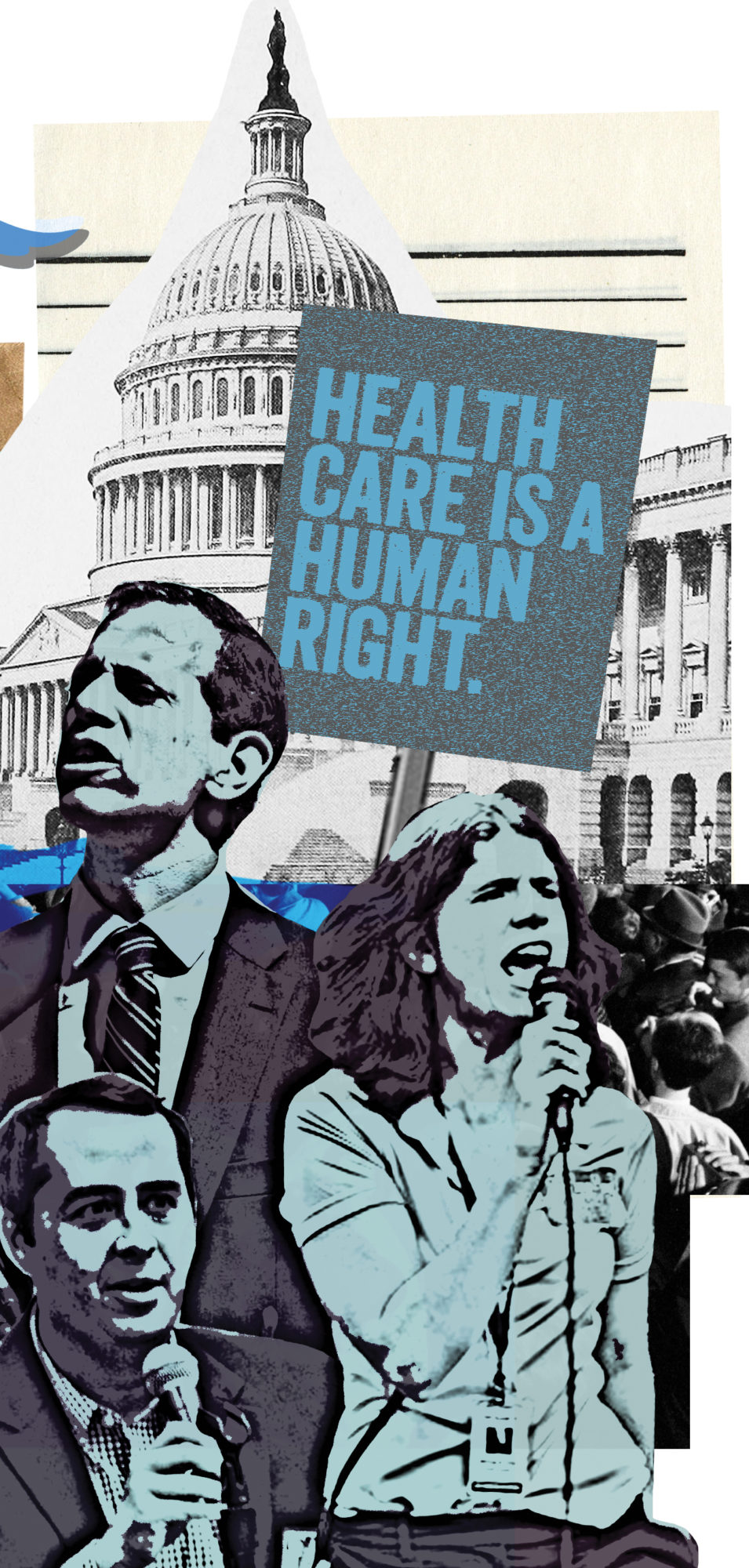Medicare-for-All Truths Drown Out Industry Lies
Public Citizen News / March-April 2019
By Mike Stankiewicz

This article appeared in the March/April 2019 edition of Public Citizen News. Download the full edition here.
Maryland resident Andy Brodock stood outside the U.S. Capitol in late February and described to reporters how he battled his insurance company in his wife’s dying days to have her cancer treatments covered.
Jennifer Epps-Addison, a California resident and co-executive director of the Center for Popular Democracy, similarly described how she and her husband struggle with their insurer to get the care he needs for his multiple sclerosis.
The stories are all too common – with Americans poor and middle class, urban and rural, black and white – wrestling with an inefficient and wasteful system that makes it difficult, if not impossible – for them to get health care.
That’s why a Medicare-for-All health care system is gaining steam.
U.S. Reps. Pramila Jayapal (D-Wash.) and Debbie Dingell (D-Mich.) introduced the Medicare for All Act of 2019 at the Feb. 27 press conference, surrounded by other lawmakers and activists. The legislation has a record 106 original co-sponsors, and House Speaker Nancy Pelosi has announced support for hearings on the legislation, which would be the first time a single-payer health care system will be taken seriously by House leadership.
In the U.S. Senate, Medicare-for-All legislation is expected to be reintroduced by Sen. Bernie Sanders (I-Vt.), however hearings are not expected as Republicans control the chamber.
“In America, we pay more – much more – for health care than other countries, and we get less – much less,” said Robert Weissman, president of Public Citizen, who spoke at the press conference. “Tens of millions go uncovered, tens of millions more find that their insurance doesn’t cover what they need and our health outcomes are inferior to those other countries. We can do better.”
Jayapal’s Medicare-for-All legislation would cover every American, end co-pays and deductibles, and expand Medicare to cover dental, visual and long-term care.
But the momentum is bringing out powerful industries that profit from the existing system and are peddling falsehoods about Medicare-for-All.
Public Citizen is beating them to the punch. On Feb. 4, the organization issued a comprehensive look at the research available on Medicare-for-All, that debunked the myths and laid out how such a policy would cut administrative waste, reduce profiteering off health care and lead to additional federal revenue.
The analysis, “The Case for Medicare-for-All,” found that such a health care system not only would reduce overall health care spending compared to employer-based insurance, but also would improve financial stability for struggling rural hospitals and doctors, without increasing patient wait times.
Patients would no longer need to worry about debt-inducing medical bills or loss of coverage.
Researchers at the University of Massachusetts, Amherst and elsewhere have shown that:
- Medicare-for-All would save money by reducing administrative costs by $500 billion per year (U.S. health care spending totals about $3.5 trillion per year) and allowing the government to negotiate for more affordable medicines;
- Medicare-for-All would cost patients less than employer-sponsored insurance and improve access to community-based services, including home health care;
- Under Medicare-for-All, there would not be increased wait times, in part because improved financial incentives for providers would mean better prioritization of care, leading to improved access and a reduction of unnecessary costs.
Industry groups aren’t just on the wrong side of the facts; they also are on the wrong side of public opinion.
A Kaiser Family Foundation tracking poll has found a consistent increase in support for a single-payer government health care system over the past 20 years. Additionally, a January 2019 Harvard/Politico poll found that 68 percent of all voters, including 70 percent of independents, said providing health insurance coverage for everyone through a taxpayer-funded national plan is an extremely important priority.
Public Citizen is investing more resources to ramp up a massive grassroots campaign to build the people power needed to overcome the corporate opposition and eventually win Medicare-for-All. On Feb. 14, thousands of Public Citizen members participated in a virtual townhall meeting with Representative Jayapal and Weissman to learn about the details of the Medicare-for-All bill and the next steps in our campaign. Hundreds of our members committed to urge their members of Congress to sign on as cosponsors to the Medicare-for-All legislation and to educate their communities and local elected officials to build a lasting movement to move Medicare-for-All over the finish line.
“The people power on this issue continues to intensify as Americans feel the pain of a health care system that is focused more on profit than it is on providing health care,” said Melinda St. Louis, Public Citizen’s Medicare-for-All campaign director. “The American people won’t stop pushing for significant change. The question is not if we will win – it is when.”